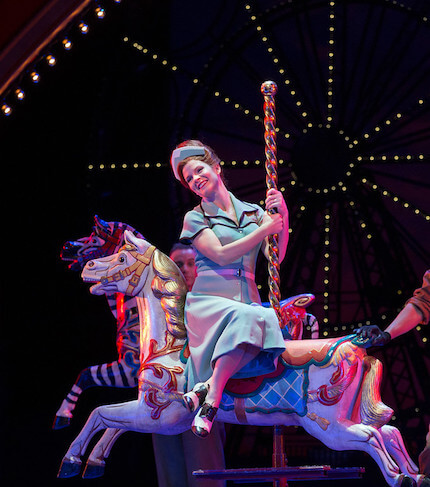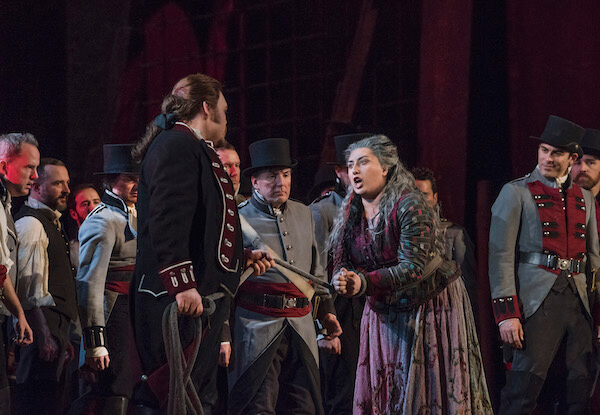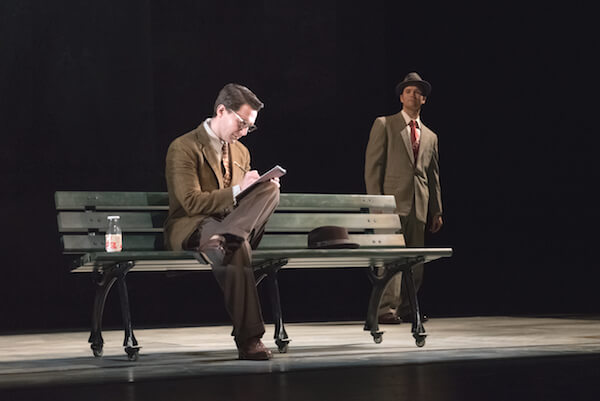Simon Keenlyside as Prospero and Isabel Leonard as Miranda in Thomas Adès's “The Tempest.” | KEN HOWARD/ METROPOLITAN OPERA
The Met’s third performance of Thomas Adès’ 2004 “Tempest” took place in extraordinary conditions: New York City, including the opera house, had been virtually closed for two days after the most destructive local storm since 1938, with the most flooding since 1821. Millions of people remained in darkness and the crucial subway system remained inactive. So it was miraculous that the musicians, the backstage crew, and a decent-sized audience were able to get there at all. And, it was most ironic to witness a narrative that begins with a sinking ship, high winds, and apparent loss of life.
The opera had its mildly successful North American première in Santa Fe in 2006 under Alan Gilbert. Here, the composer himself conducted, and capably. After the near fiasco of the “Ring” — a success only to those HD viewers who encountered Wagner’s work for the first time — Robert Lepage provided a production more kinetic and visually striking than what Jonathan Kent had done in Santa Fe.
The Dukedom of Milan and its offshore court-in-exile become 19th century La Scala, employing the scarcely new, but often entertaining idea of a theater within a theater. Prospero was the part’s creator, Simon Keenlyside, working very hard vocally at first and sounding constricted at range extremes, but excellent at soft and medium dynamics and a splendid actor. He stage-managed and oversaw events from backstage (Part One) and the auditorium (Part Two).
Many entrances took place from the prompter’s box, and Ariel danced and cavorted balletically off a flying chandelier. Audrey Luna, a young Zerbinetta and Queen of the Night, performed with astonishing vigor and grace but one fears the same kind of vocal damage that beset the more beautiful tones of Cyndia Sieden, the London and Santa Fe Ariel. The part largely sits at high C and above.
The major problems with the piece — a serious effort with much fine orchestral writing, harmonics taking precedence over melodic content — remain the presence of a female chorus of Neapolitan courtiers, negating the effect, so central in Shakespeare, of Miranda’s uniqueness as a woman, and, despite judicious pacing, the poor quality of Meredith Oakes’ verse paraphrases of the play. One comes to dread every completion of the facile, doggerel rhymes. Nor is the word setting, particularly in choral passages, very transparent, though a lovely Brittenesque passacaglia toward the end shines as an exception.
Isabel Leonard looked lovely and sounded very smooth as Miranda, not a role of strong musical profile. Adès strains his tenors mercilessly. William Burden’s King emerged best, with phenomenal diction and expressive and beautiful timbre. As his son Ferdinand, Alek Shrader sang musically but — perhaps wisely — as if on eggshells, rarely opening out on top. Alan Oke sang Caliban with conviction and some charm in a worn, largely unlovely spieltenor.
The original Ferdinand (the recently ailing Toby Spence, a thoughtful artist) was brave to perform Antonio but sounded in vocal distress until his final scene. He did, however, furnish crystalline diction. John del Carlo, his bass thinning on the bottom, lacked the gravitas for Gonzalo’s socialistic vision. Best of the rest was Iestyn Davies’ excellent and theater-filling turn as the drunken conspirator Trinculo.
Lepage might have done more in the way of Personenregie to differentiate these courtiers; but as sheer spectacle, his team’s design work pleased more than many a recent company effort. In the circumstances, this was a “Tempest” to respect.
Later this season, the Met presents a new “Giulio Cesare” starring David Daniels. Detroit’s Michigan Opera Theatre ventured one last month, its first baroque effort. I heard a few lobby mutterings — “This opera will never make the Met!” was a pleasure to refute — but the audience in the fabulous restored Opera House November 14 had a very good time.
Michael Shell’s production was a scattershot version of the Orientalist “They’re making a silent movie!” trope we’ve seen visited on many an “Entfuehrung” and “Italiana” in recent years. Certainly the work itself blends comic and tragic elements, but there was little visual or conceptual logic on display here, plus a kind of underlying jingoism I found uncomfortable: “Va tacito” showed Daniels’ Cesare playing Realpolitik chess with Anthony Roth Costanzo’s Tolomeo through knocking down and purloining Egyptian idols — to audience giggles.
The two countertenors proved well contrasted in timbre. Daniels started rather choppily but found his accustomed form in legato numbers. He gives greater color and animation than previously to the conqueror’s key recitative passages. Costanzo, mustachioed a la Douglas Fairbanks, made Tolomeo a petulant martinet but never descended into caricature vocally in his three arias, and his cadenzas and ornaments excelled.
Lisette Oropesa, her voice flowing and clear, looked sensational in James Schuette’s Cleopatra designs and — though trills were merely indicated — proved herself ready for the great role. Canadian Allyson McHardy, a stylish Handelian, made a substantial, attractive figure of Cornelia.
Howard Arman’s foursquare conducting seemed to take place rather separate and apart from what the fine singers were doing, and he earned my ire for countenancing the reduction of “Cara speme” — one of the score’s great numbers — to just its initial A section, despite the vocal excellence of Emily Fons’ visually credible Sesto. Other numbers, like “Tu la mia stella sei,” disappeared altogether.
MOT’s season continues enticingly with Christine Goerke in “Fidelio” and Latonia Moore in “Aida.”
Back in New York, “La Clemenza di Tito” (November 20) was that increasing rare thing — an unqualified great night at the Met. Jean-Pierre Ponnelle’s neoclassical staging holds up well, and Harry Bicket elicited an excellent performance from orchestra and chorus. Elina Garanca’s beautifully sung, forthrightly acted Sesto marked her first genuine artistic milestone locally.
Giuseppe Filianoti (Tito) and Barbara Frittoli (Vitellia) gave us the pleasure of native Italian in the recits, and though both omitted some high notes, they gave committed performances with much admirable vocalism. Crystalline-voiced Lucy Crowe (Servilia) did well in her first Met part. Less extraordinary vocally, Kate Lindsey (Annio) and Oren Gradus (Publio) held their own, she with a memorable “Tu fosti tradito.”
David Shengold (shengold@yahoo.com) writes about opera for many venues.



































